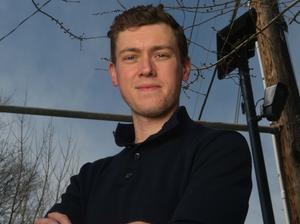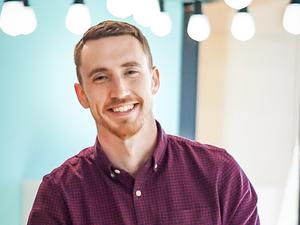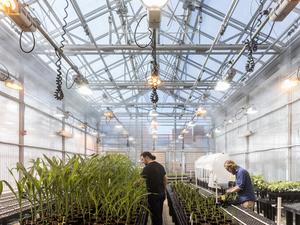Felix Williams can’t recall the exact advice he received on his first day as an intern at St. Louis venture capital firm iSelect Fund, but it was something along the lines of “if you get in my way, you’re fired.”
The comment, from iSelect’s Managing Partner and CEO Carter Williams (no relation) was made in jest, but it seemed appropriate at the moment. That's because Felix Williams, by his own admission, was under-qualified for the internship.
He was only 17 years old.
Knowing little about venture capital at the time, he made good use of the opportunity. A year later, in 2017, Felix Williams launched his own firm, St. Louis-based Lagomaj Capital, which has amassed an investment portfolio of 38 deals, a figure that has doubled over the past year and a half.
Still just 22, his investments so far range from the high profile (Elon Musk's SpaceX) to the familiar (St. Louis agtech stalwart Benson Hill), and touch on the agriculture, software, transportation and media industries.
While his age might raise eyebrows, it's his unusual investment strategy that he hopes will leave the biggest imprint on St. Louis and the broader world of venture capital.
Lagomaj, he said, focuses on so-called "creative" deals, engaging with portfolio companies in ways that stretch beyond just doling out capital. In addition to investing in Benson Hill, for example, Lagomaj is a partner in developing a 47,000-square-foot research-and-development facility for the company in Creve Coeur.
It's an approach that he says bucks the typical venture capital approach regarding structure and investment timelines. And he hopes it's one that sets him apart in a venture capital world that's too focused on generating fees and delivering returns on rigid timelines.
“If you’re just writing a check in today’s venture world, it’s not going to be enough," he said. "Good entrepreneurs choose who their investor is. That hasn’t always been the case."
Putting the pieces together
As long as Williams can remember, he’s been obsessed with problem solving. It’s a characteristic he attributes to creating his interest in business.
“My parents tell stories about me, before I could even read or write, wanting to do puzzles all day every day,” he said.
Building his own venture capital firm was a puzzle of its own kind, forcing him to find key pieces — namely investors — in order to begin operations.
“As you might imagine, it was not easy finding people who were willing to give significant amounts of capital to someone that young,” he said.
In its first year, Lagomaj deployed less than $1 million in capital, making it more of an angel investor capable of distributing smaller amounts of capital, rather than a full-blown venture capital firm it aspired to be.
“We started very, very small. We’re talking $10,000 investments," he said. "What it really allowed us to do is build a track record."
Williams declined to disclose his firm’s total assets under management, though he said the figure has tripled since the start of 2020. And like most venture firms, Lagomaj is also coy about its funding sources. Though he declined to identify them, Willams said he's raised capital from local high-net-worth individuals, and that much of his early success in finding investments was built on tapping his personal network to meet potential investors.
“It hinged a lot, quite frankly, on testimonials and with people I’ve worked with previously, lending credibility through established professionals who believed also in what I was doing,” Williams said.
While Williams has tapped others for advice in launching Lagomaj, his mentor, iSelect's Carter Williams, said much of its success so far can be attributed to Felix's own strengths.
“He has a lot of natural intuition,” Carter Williams said. “He’s a quick study. Anything that’s written on the web or other people have said about venture capital, he’s probably read some version of it.”
Key to Lagomaj’s early days was a major win in July 2018 when Agrible, a Champaign, Illinois, agtech startup in which Lagomaj had invested an undisclosed amount of capital, was acquired by publicly traded agriculture firm Nutrien for $63 million. That deal, Williams said, provided validation to both the firm’s existing and potential investors.
“It gave some fuel to the fire, no doubt about it,” he said.
Finding investors was one piece of the puzzle. The other was convincing startup founders that his age wasn't an obstacle.
At least once Williams was asked in a meeting when his boss was showing up. He also said he's encountered resentment from startups who didn't like being judged by someone so young.
Those experiences helped him to hone his approach. He began to connect with founders and CEOs first through email or by phone first, focusing the dialogue around technology or strategy. The goal is to highlight his expertise over his youthfulness, but it can also lead to some surprised reactions upon meeting in person. One CEO "never said anything, but it was clear as soon as I walked in that he was a little surprised,” Williams said.
Williams' age wasn't a concern for Vic Merjanian, CEO of Titan Health & Security Technologies. The Newport Beach, California-based company, a developer of emergency alert and mass notifications systems, has received several rounds of investment from Lagomaj. As a veteran entrepreneur, Merjanian said he didn't shy away from Williams, having learned sometimes the best investors are ones who break the mold
"In the beginning when you start dealing with investors, you might have a certain precept of what an investor looks like. If you’ve actually been around on the street for a minute, investors really vary," he said. "What you might think is a stereotypically ‘good’ investor may not be. If it was my first rodeo, perhaps he doesn’t meet expectation."
Williams has entered the startup investment field as the age of its workforce gets younger. A 2018 study published by the National Venture Capital Association and accounting firm Deloitte found that 42% of venture capital employees that year were between 22 and 35 years old, a 7% increase from just two years prior.
Founders like Merjanian welcome that youthfulness, including in the case of Williams.
“He is younger, but one of the flip sides of that is as a tech company, he actually gets what we are doing," Merjanian said. “He’s got some ideas and he’s got some vision too. He’s not as old as some of the other investors, but he’s definitely very tech forward and savvy on business. That’s a good combination for us as a company he’s invested in."
A rare approach
Since its launch in 2012, Benson Hill has raised more than $280 million in venture funding, including from big-name investors like GV, the venture capital arm of Google, and global agriculture giants Chesterfield-based Bunge Ltd. and Netherlands-based Louis Dreyfus Co.
But when it sought to build a new research and development facility for its fast-growing business producing food ingredients, it turned to Lagomaj Capital.
Benson Hill and Lagomaj, which was already an investor in the company, have partnered to develop the new 47,000-square-foot Crop Accelerator facility, which will open by the end of the year in a former warehouse facility just north of the agtech firm’s headquarters in Creve Coeur.
The project is a type of deal Benson Hill CEO Matt Crisp says likely wouldn’t have been attractive to many, if any, of its other investors. Typical venture firms have a narrow risk profile, and often limit their financial involvement to fund rounds. Partnering on real estate deals isn't usually part of the proposition.
Benson Hill, which in May announced plans to go public, could have sought funding from a traditional lender. But Crisp, himself a former venture capitalist, said he liked how Williams wasn't limiting his role as investor to only funding rounds.
“He’s making investments in projects like this, which help enable the technology-based companies or innovation-driven companies to succeed,” Crisp said. “When you have an organization like Lagomaj and a view that Felix has, he’s looking for something that’s a deeper and wider partnership that actually more holistically enables the business. That’s a really big benefit. It’s very rare.”
The Benson Hill project is emblematic of the type of deals Williams wants to pursue. It's targeting other ways to back startups, through means like debt financing and joint ventures, and could even venture into acquisitions. Williams believes that being open to such deals gives Lagomaj a competitive advantage and could make it more appealing to promising investment targets in a crowded venture capital market, which saw a record total of fundraising for investment funds in 2020 nationally.
“There’s more to be done here than to make a dollar,” Williams said.
The firm is in the process of expanding to Austin, Texas, which will become the firm’s first location outside St. Louis. Lagomaj is currently hiring for five roles, including a managing director, in Austin.
The Austin office marks what Williams calls “phase two” of his firm. The initial phase focused on building out the its processes and strategy. The second is about accelerating the vision and taking advantage of Austin's strength in the software industry while complementing St. Louis' muscle in biotech and agtech.
“It’s deepening our bench to bring talent that maybe these entrepreneurs haven’t always had access to,” Williams said. “What we’re really trying to achieve is (becoming) a more holistic firm aligned with our goals. It’s about bolstering what we have now, growing it and making it bigger."
A broader vision
The Texas expansion also satisfies Williams' ambition to have an impact beyond St. Louis.
He expects to spend the next year between St. Louis and Austin. Then in fall 2022, Williams will head to Palo Alto, California, to attend graduate school at Stanford University.
The allure of Silicon Valley, though, isn't likely to draw him out of St. Louis full time. Williams said he hopes to continue playing a role in developing St. Louis’ innovation hubs, particularly the 39 North agtech district in Creve Coeur.
Crisp, whose company has been instrumental in the district’s growth, believes Williams and Lagomaj could set the tone for further developing the hub through startup investment and projects similar to the Crop Accelerator.
“My hope is that Lagomaj sets the pace and continues to be a leader in investing in this district such that other folks view it as an attractive investment opportunity as the region here and campus here continues to appreciate,” Crisp said.
Williams envisions Lagomaj one day opening its own startup accelerator focused on developing companies that could tackle key social issues such as climate change and food insecurity. “I see a lot of opportunity in bringing in people younger who understand that and want to be a part of it,” Williams said.
ISelect’s Carter Williams said Lagomaj’s problem-solving approach is a sign of the younger generation eager to drive change through innovation rather than waiting on politicians or governments to do so. It's a transition he welcomes, so much so that he now finds himself sometimes taking advice from Felix Williams, rather than the other way around.
“At times, the mentor-mentee relationship is reversed,” Carter Willams said.












